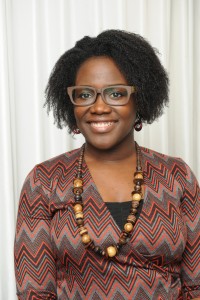Think Afro-Pink!
February 13/2017
Mid-way through Black History Month, approximately 15 mother-daughter pairs will dance their way to better breast health at Think Afro-Pink, a breast cancer awareness event on February 17, 2017 at U of T’s Hart House hosted by public health researchers.

Dr. Onye Nnorom, Associate Program Director of DLSPH’s Public Health and Preventive Medicine Residency Program
Participating in a Zumba class is a fun way to exercise — an activity that helps reduce the risk of breast cancer — but it’s also a savvy way to reach two generations of women in the Black community, which is traditionally silent on cancer.
“Providing a platform for mothers and daughters to talk about breast cancer is important because in many cultures, so-called lady issues are not openly discussed,” said Nakia Lee-Foon, a third-year PhD Social and Behavioural Health Sciences student and a second generation Canadian who plans to attend the event.
Think Afro-Pink is a unique cancer research and education initiative that targets second generation Canadians to influence the health behaviours of their parents and help their families navigate an increasingly complex health system. Event attendees will receive information about breast cancer and how it disproportionally affects Black women, participate in a one-hour Zumba class and receive a mammography incentive voucher.
“Anecdotally, we know that second generation Canadians help their parents navigate the healthcare system, including breast cancer screening,” said Dr. Onye Nnorom, Associate Program Director of the Dalla Lana School of Public Health’s Public Health and Preventive Medicine Residency Program.
“That’s why we launched Think Afro-Pink, a health promotion awareness event that will provide breast cancer information to university students to help them influence their mothers and relatives to book a mammogram.”
The Canadian Cancer Registry does not collect information on race or ethnicity, but according to the American Cancer Society, African American women have a 41 per cent higher breast cancer death rate, and are nearly twice as likely to die from cervical cancer as white women. Canadian research indicates that immigrant women, including Black women, are less likely to get their mammograms or pap tests and often go to the doctor later on, when a cancer has progressed and is harder to treat.
“There is a lot of silence in the Black community and people think that cancer is not a Black issue,” said Nnorom, who also leads the Health Equity Research Collaborative (HERC), a group of Toronto-based researchers who are interested in health disparities and community-based solutions.
Last year, Dr. Nnorom, HERC and their community partners launched Toronto’s first breast and cervical cancer peer education program with an Afrocentric lens called Ko-Pamoja. Think Afro-Pink expands on lessons learned from this education initiative by empowering second generation women to be cultural ambassadors and address the health disparity between black and white women with breast cancer.
“It is my hope that we can address health inequity by empowering communities and families to be health champions and address the needs of diverse communities in Ontario,” said Dr. Nnorom.
Click here to register for the event.